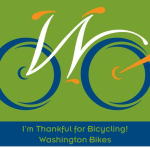$10 million increase to Safe Routes to Schools and bike and pedestrian grants.
The 2021 Washington state legislative session was held in a mostly virtual manner due to COVID-19 pandemic. In January, legislative leaders began the session promising to deliver progress on: the COVID-19 response, economic recovery, racial equity, and climate change. Investments and reforms that passed included a low-carbon fuel standard, early learning and childcare program expansions, a host of police accountability and reform measures, and critical expenditures to address the impacts of the pandemic.
While federal stimulus dollars and revenues from healthy segments of the economy bolstered the operating budget, the transportation budget was hit hard by the pandemic. Gas taxes, toll revenues, ferry fares, and other fees and revenue sources that fund transportation infrastructure were depressed due to less driving and traveling.
These budget constraints and revenue declines added urgency to the need for a transportation investment package that Washington Bikes supported. It came down to the last days of session and in the end the two chambers did not reach agreement on a final transportation investments package. We worked throughout the 105-day session to lobby legislators on behalf of greater investment in safe streets, accessible routes for people of all ages and abilities, and multimodal investments that strengthen communities.
Even though a final package didn’t pass during the 2021 legislative session, our voices were heard. Many Washington Bikes supporters spoke up throughout the session in support of active transportation programs. Many of our funding priorities made it into the House version of the transportation investment package. Over the 105 days we saw Senate transportation leaders move in the direction we’d been asking, and in the final committee hearing on the transportation investments package they expressed a desire to increase spending for active transportation priorities in a final version of the package. We are in a good position to achieve progress when this conversation resumes.
Meantime, the two-year transportation budget contained a big win for bikes: a $10 million increase in the active transportation grants programs. The Safe Routes to School and the pedestrian and bike grant programs are consistently over-subscribed. These grants pay for projects such as sidewalks, bike lanes or safe routes, street crossing improvements, and ADA accessibility improvements. Washington Bikes was able to help secure this increase despite a final 2021-2023 transportation budget that was defined by its austerity.
Washington Bikes will continue to advocate for increased investments in active transportation as new revenue becomes available. Meantime, we are grateful that the legislative leaders acknowledged the need to increase bike and pedestrian infrastructure funding.
There is a big demand for Washington’s active transportation funds. The last grant cycle marked the highest number of requests ever for these dollars. The pandemic has changed how people move through their communities and the state. More people are biking and walking. At the same time, crash data indicates safety is declining for people who walk, bike, and roll. While we held our ground and had some small victories during the 2021 session, much work remains.
Check back for updates on a transportation investments proposal. There is a possibility that the Legislature might convene for a special session to pass a transportation investments package. We’ll keep you updated as we learn more.
2021 Policy Priorities at a Glance:
HB 1330: We wrote about our support for this electric bike sales tax exemption (read our blog post) that would make e-bikes more affordable to more people. The bill was approved by the House, but didn’t make it out of the Senate.
SB 5472: Electric bikes are banned on some state lands. This bill directs the Washington Department of Fish and Wildlife, and the Department of Natural Resources, to study and collect information about e-bike use on lands they manage, with the goal of determining where e-bike use may occur and which classes of e-bikes are acceptable. Delivered to the governor for signature.
HB 1301: Signed by the governor, this bill seeks to decriminalize transit fare enforcement. It allows a regional transit authority (RTA) to establish an alternative fare enforcement system, allowing for the issuance of a notice of violation rather than a criminal penalty that can disproportionately harm individuals unable to afford a fare. This law goes into effect on July 25, 2021.
HB 1099: Improving the state’s climate response through updates to the state’s comprehensive planning framework. This bill passed the House, but didn’t make it out of the Senate.



